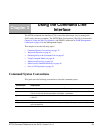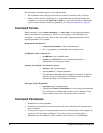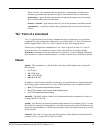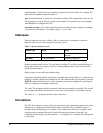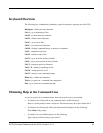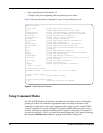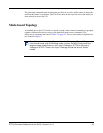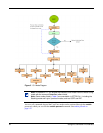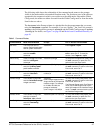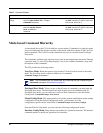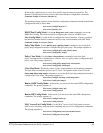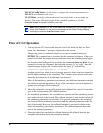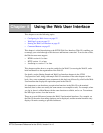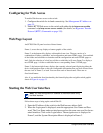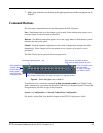
SFTOS Command Reference for the S2410, Version 2.4.1.0 47
The following table shows the relationship of the command mode names to the prompts
visible in the mode and the exit method from that mode. The first three rows in the table are
organized in the sequence in which you would access the child modes. Beyond the Global
Config mode, the modes are either accessed from the Global Config mode or from the mode
listed in the row above.
The
hostname in the Prompt column is a placeholder for the prompt name that you create
using the
hostname command. For example, if you use “Speedy”, the User Exec prompt is
Speedy>, the Privileged Exec prompt is Speedy#, and the Global Config prompt is Speedy
(Config)#
. For details, see Figure 5 on page 46 and Mode-based Command Hierarchy on
page 48.
Table 3 Command Modes
Command Mode Mode Access Method Prompt Exit or Access Previous Mode
User Exec This is the first level of
access. Perform basic tasks
and list system information.
hostname >
Enter
logout or quit.
Privileged Exec In the User Exec mode,
enter the
enable
command.
hostname # To exit to the User Exec mode, enter
exit or press Ctrl-Z. To close the
session, enter
logout or quit.
Global Config In the Privileged Exec mode,
enter the
configure
command.
hostname (Config)# To exit to the Privileged Exec mode, enter
the exit command, or press Ctrl-Z to
switch to the User Exec mode.
DHCP Pool Config In the Global Config mode,
enter the
ip dhcp pool
pool-name
command.
hostname (Config-dhcp-pool)# To exit to the Global Config mode, enter
the
exit command. To return to the User
Exec mode, enter Ctrl-Z
Interface Config In the Global Config mode,
enter the interface
command.
hostname (Interface "if
number")#
To exit to the Global Config mode, enter
the exit command. To return to the User
Exec mode, enter Ctrl-Z.
Interface Range In the Global Config mode,
enter the
interface range
range
command.
hostname
(conf-if-range-range)#, where
range consists of the specified
interface range. For example,
for VLANs 100–200, the
prompt is hostname
(conf-if-range-vl-100-200)#
To exit to the Global Config mode, enter
the
exit command. To return to the User
Exec mode, enter Ctrl-Z.
The Ethernet Range mode, Port Channel
mode, and VLAN Range mode are the
three child modes of the Interface Range
mode. The
exit command returns you to
the Interface Range mode.
Interface VLAN In the Global Config mode,
enter the command
interface vlan vlanid.
hostname (conf-if-vl-vlan-id) # To exit to the Global Config mode, enter
the
exit command, or press Ctrl-Z to
switch to the User Exec mode.
Line Config Mode In the Global Config mode,
enter the
lineconfig
command
hostname (line) # To exit to the Global Config mode, enter
the
exit command. To return to the User
Exec mode, enter Ctrl-Z.



